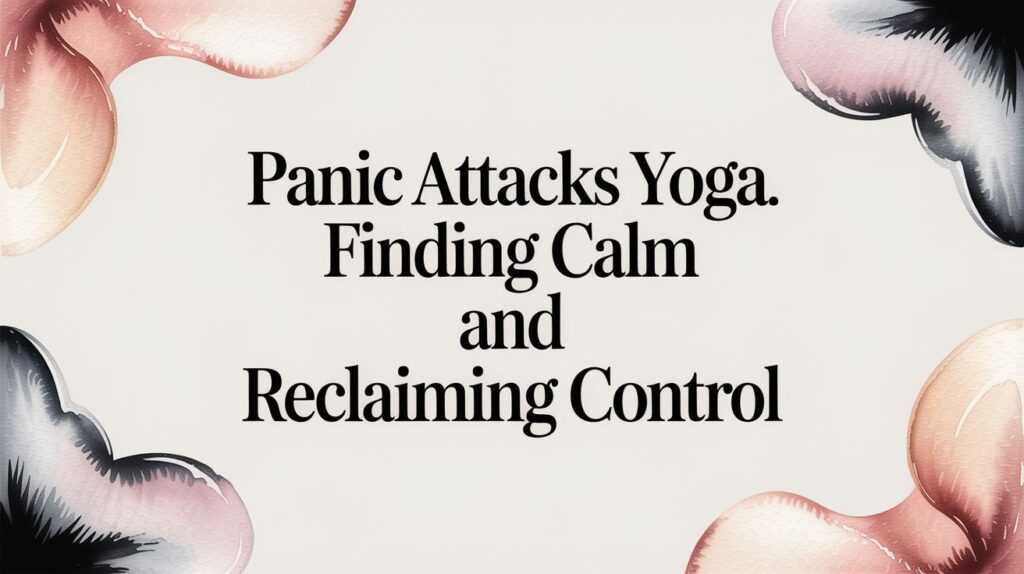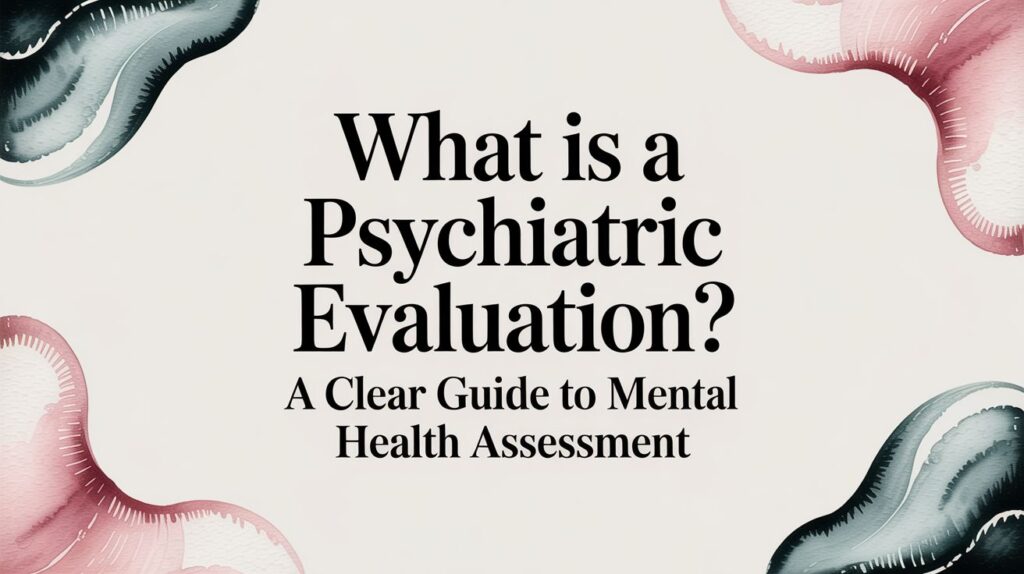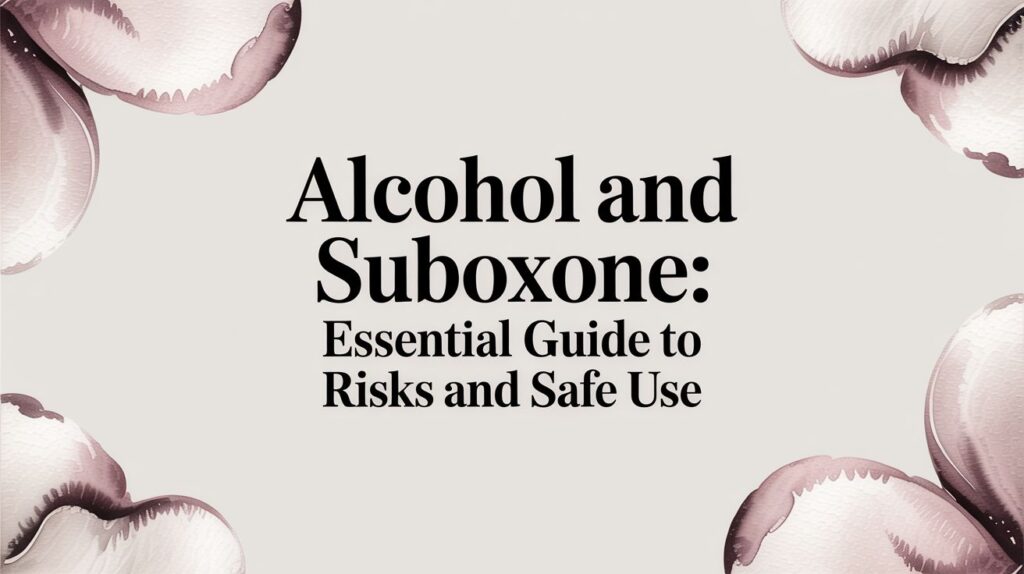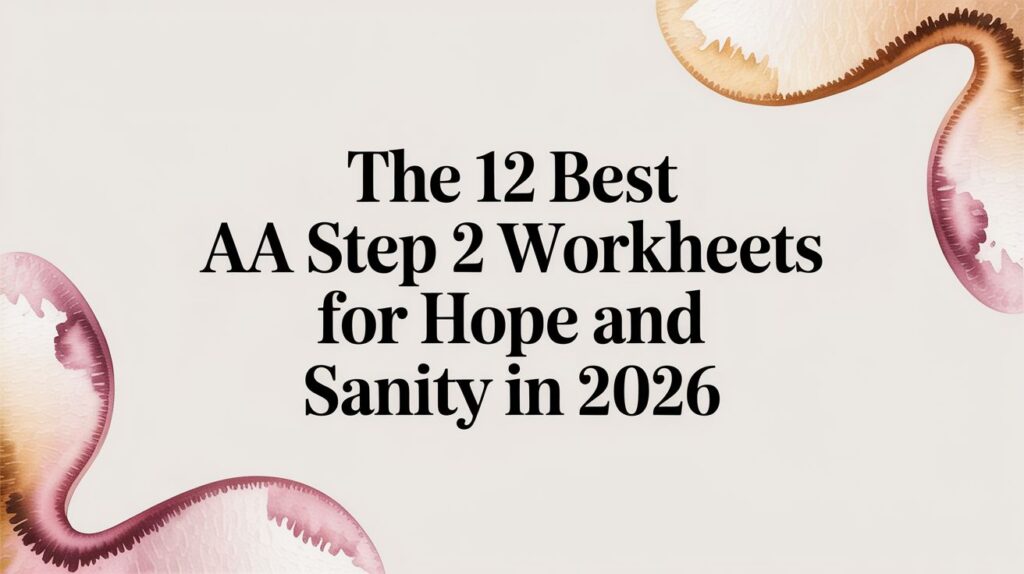When you're in recovery, learning to set boundaries is less about building walls and more about drawing a line in the sand. It’s a way of protecting your physical, emotional, and mental space from the triggers and stress that can derail your progress.
This isn’t about pushing people away. It’s about taking back control of your own life and creating the safe, stable environment you need to heal for the long haul.
Why Strong Boundaries Are Essential for Recovery

Trying to manage old relationships and habits during recovery can feel treacherous. This is exactly where boundaries come in—not as walls, but as clear guidelines that protect your sobriety. Think of them as the guardrails on a steep mountain road; they keep you on a safe path and stop you from veering into danger.
Especially in the early stages, you're incredibly vulnerable to outside pressures and old triggers. Setting firm limits is one of the most powerful things you can do to safeguard your new stability.
Defining Your Protective Limits
Boundaries in recovery aren't one-size-fits-all. They need to be customized to your specific needs, challenges, and triggers. They generally fall into a few key categories, each serving a unique purpose on your healing journey.
- Physical Boundaries: This is all about managing your physical space. It could mean avoiding bars or parties where substances are readily available or making a hard rule that no triggering items are allowed in your home.
- Emotional Boundaries: These are about protecting your mental energy. It’s learning to say "no" to conversations that drain you, refusing to carry the weight of someone else’s problems, and giving yourself permission to walk away from emotionally volatile situations.
- Digital Boundaries: In a world where we’re always connected, limiting your digital exposure is huge. This might look like unfollowing social media accounts that glorify substance use or muting contact with people who consistently undermine your recovery.
At its heart, setting boundaries is about creating a predictable and structured environment where you can actually heal. It’s an empowering act of self-respect that reinforces your commitment to a better future.
The Foundation for Sustainable Healing
These protective measures are absolutely fundamental to maintaining both sobriety and mental well-being. By setting clear physical boundaries, you’re actively reducing your exposure to relapse triggers.
In the same way, emotional and digital boundaries shield you from the kind of stress and negative social comparison that can completely destabilize your mental health. This whole process of creating a safe space is a critical skill taught in addiction treatment programs. You can learn more about how https://alturarecovery.com/blog/what-is-rehab helps build these foundational skills.
Ultimately, these limits aren't about restriction—they're about liberation. They free you from the old patterns and toxic relationships that kept you stuck, creating the space you need for real growth and lasting freedom.
How to Identify Your Personal Boundary Needs
Before you can build strong fences, you first have to survey the land. The same is true in recovery. Setting effective boundaries starts with getting brutally honest about where you need protection the most.
This process is deeply personal—the limits that bring one person peace might feel like a cage to someone else. The best way to start is by tuning into your own emotional and physical cues as you move through your day.
Think of feelings like resentment, exhaustion, or anxiety as your internal compass. These emotions are almost always pointing to a boundary that’s been crossed or is missing entirely. For example, do you feel that familiar knot in your stomach whenever a specific family member calls? That’s a clear sign an emotional boundary is needed in that relationship.
Mapping Your Triggers and Drains
To create a practical "boundary map," you have to pinpoint the specific situations, people, and environments that drain your energy and test your resolve. This isn’t about blaming anyone; it's about gathering personal data to protect your sobriety.
Start by looking for these common challenges in your own life.
- Relational Triggers: Who leaves you feeling depleted after you interact with them? This could be a friend who still romanticizes your using days or a parent who subtly questions your recovery methods.
- Environmental Drains: Which places spike your stress levels? Maybe it’s your high-pressure workplace, a certain route home that passes old hangouts, or even just a cluttered, chaotic living space.
- Internal Pressures: Pay close attention to your own thought patterns. Do you feel a compulsive need to say "yes" to every request because you’re terrified of disappointing someone? This internal people-pleasing is a critical, and often overlooked, area for boundary work.
This kind of self-reflection is a huge part of healing, especially when past events have made it hard to even recognize your own needs. Understanding the connection between past experiences and current triggers is a powerful step, and you can learn more about this in articles explaining what is trauma-informed therapy.
Asking the Right Questions
Once you have a general sense of your triggers, it’s time to get specific. Grab a journal and start asking yourself some targeted questions. Write down your answers without judging them. The goal here is clarity, not perfection.
Take a moment to reflect: When do I feel most authentic and at peace? And on the flip side, when do I feel like I'm performing or shrinking myself to fit in? The gap between those two feelings is exactly where your most important boundaries need to live.
Try these prompts to get the ball rolling:
- Which conversations consistently leave me feeling worse than when they started?
- What activities or favors do I only agree to out of guilt or obligation?
- Who in my life respects my "no," and who tries to negotiate it?
- Where do I feel physically unsafe or tempted to fall back into old habits?
Answering these questions honestly creates the blueprint for setting boundaries that actually work for you in recovery. It shifts you from a vague sense of being overwhelmed to having a clear, actionable plan for self-preservation. This is the map that will guide you in building the structure you need to truly thrive.
Managing Difficult Conversations with Family and Friends
Knowing you need boundaries is one thing. Actually communicating them to the people you care about? That’s where the real work begins.
These conversations can feel incredibly intimidating, loaded with the potential for hurt feelings, misunderstandings, or even outright conflict. But learning how to have them is one of the most critical skills you'll develop. It's how you reshape your relationships to support your recovery, not undermine it.
The goal isn't to pick a fight or issue an ultimatum. It's to calmly and clearly state what you need. Think of it as teaching others how you need them to show up for you now. This takes preparation, a bit of courage, and a solid commitment to protecting your sobriety—even when it feels awkward.
Scripts for Common Recovery Scenarios
Being put on the spot is tough. That’s why having a few phrases in your back pocket can make all the difference. These aren’t rigid lines you have to memorize, but rather starting points you can adapt to your own voice and situation. The key is to be direct, kind, and firm.
Let's walk through a few real-world examples:
Declining a Triggering Invitation: A friend invites you to a late-night concert at a bar where you used to drink heavily. Instead of a vague excuse, try something clear: "Thank you so much for thinking of me. That's not a healthy environment for me right now, but I'd love to grab coffee next week."
Requesting a Sober Home Environment: You live with a family member who still keeps alcohol in the house. You could approach it with: "I love you, and to support my recovery, I really need our home to be an alcohol-free space. Can we work together on this?"
Addressing Unsolicited Advice: A parent is constantly questioning your recovery choices or offering "helpful" suggestions. A calm but firm response could be: "I really appreciate how much you care about me. I'm working closely with my therapist and support group, and what I need most is for you to trust that I'm on the right path."
It's completely normal to find these conversations hard. The most common hurdles people face are feeling guilty or fearing they'll start a conflict.
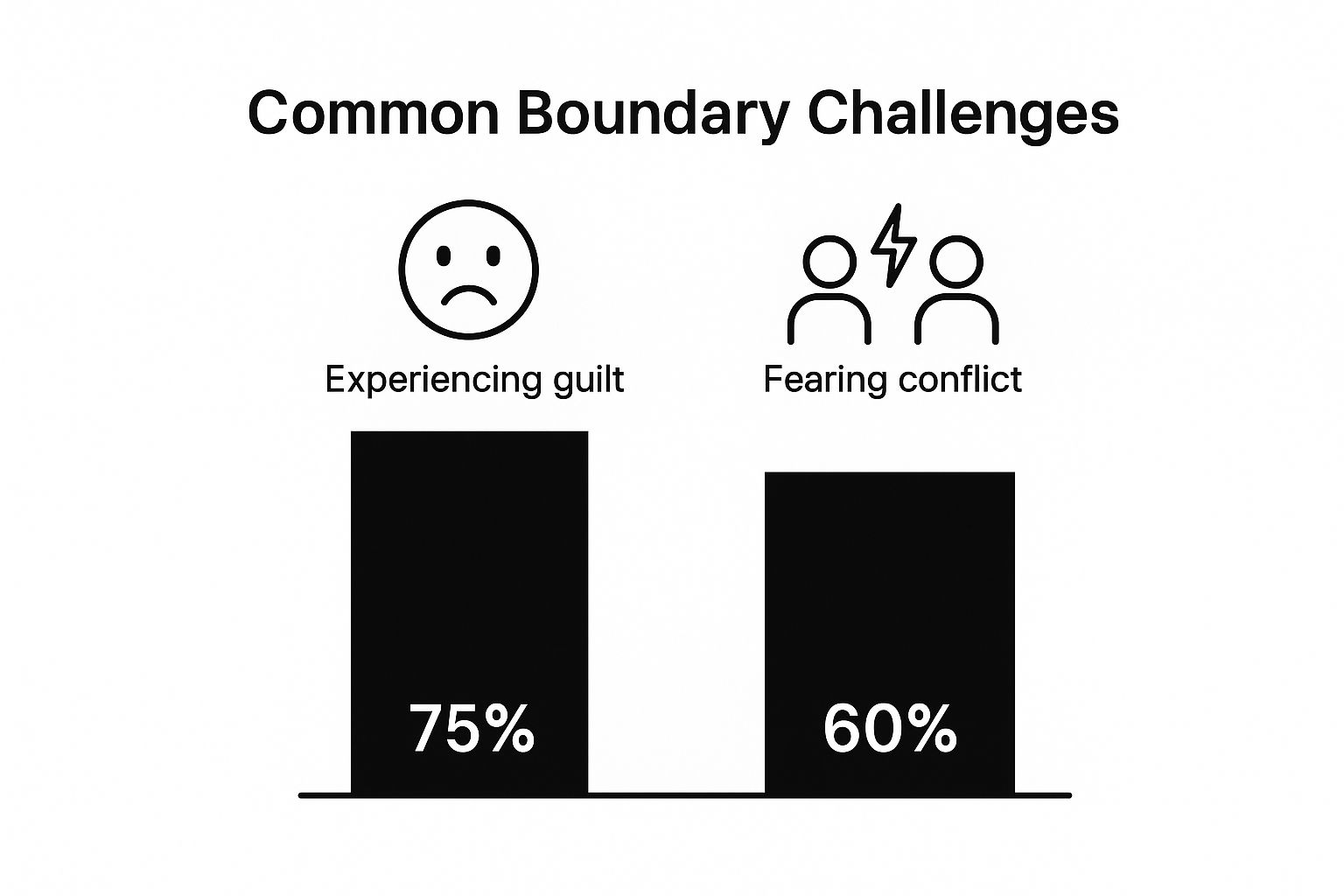
This visual really drives the point home. While a massive 75% of people struggle with guilt when setting boundaries, another 60% are held back by the fear of causing conflict. If you feel this way, you're definitely not alone.
When you're trying to figure out what to say, it helps to have a quick reference. Sometimes just seeing the words can make them easier to speak.
Effective Phrases For Setting Relational Boundaries
Here’s a simple table to help you reframe your language from blame-focused to need-focused.
| Scenario | What Not To Say (Avoids Blame) | What To Say (Clear & Respectful) |
|---|---|---|
| A friend pressures you to have "just one" drink. | "Why are you always trying to sabotage me?" | "I'm not drinking tonight, but I'd love a sparkling water. Please respect my decision." |
| A parent brings up past mistakes during a tense moment. | "You always do this! You just want to make me feel bad." | "Bringing up the past isn't helpful for me right now. I need to focus on today." |
| A loved one offers unsolicited financial "help" with strings attached. | "You're just trying to control me with your money again." | "Thank you for the offer, but I need to manage my own finances to build my independence." |
| Someone is gossiping about another person's recovery. | "You shouldn't be talking about them like that." | "I'm not comfortable being part of this conversation. Let's talk about something else." |
Keep these phrases in mind as a starting point. The goal is always to state your need clearly without making the other person feel attacked, which gives your boundary the best chance of being heard and respected.
Handling Pushback and Guilt Trips
Let's be realistic: not everyone will respond with immediate understanding. Some people might feel rejected, confused, or even angry. When you encounter resistance, your only job is to hold your boundary. It is not your job to manage their emotional reaction.
"I am responsible for what I say, not for what you understand."
This simple mantra can be incredibly grounding. Your boundary is a statement about your needs. It's not an accusation or a judgment of theirs.
If someone tries to lay on a guilt trip, refuse to get pulled into a debate. Simply and calmly restate your boundary. For example, if they say, "You're no fun anymore," you can respond with, "My health has to be my priority right now." End of discussion.
This isn't just a communication trick; it's an active survival strategy. Qualitative research shows that individuals in long-term recovery actively change their social circles, avoiding people and places that don't respect their sobriety. You can explore more of the research on the role of social relationships in recovery on pmc.ncbi.nlm.nih.gov. This practice isn't selfish—it's an essential part of building a new, sober identity that can last.
Building a Sober Network That Supports Your Growth
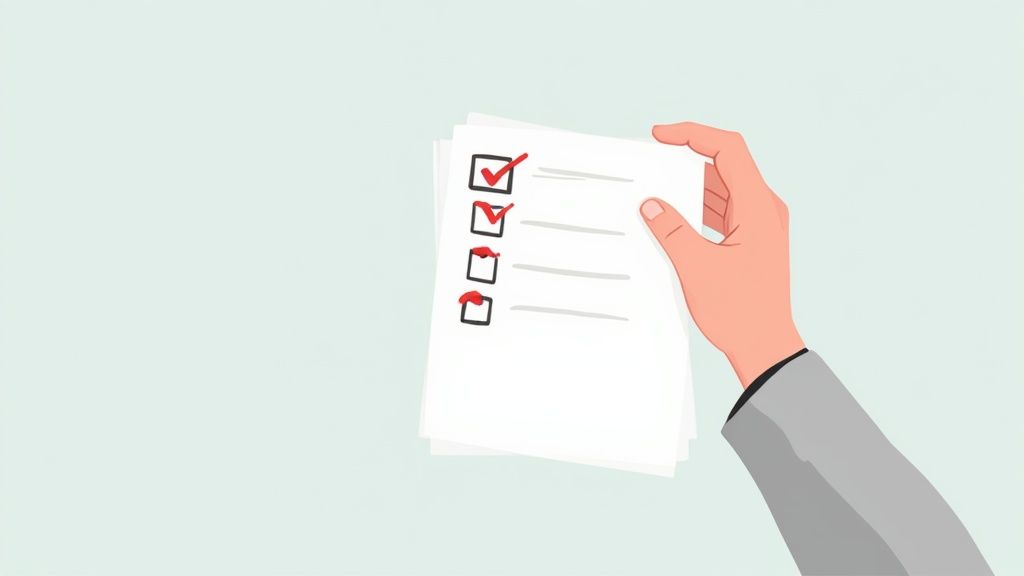
Successfully setting boundaries isn’t just about putting up fences; it’s about clearing out the overgrown weeds to make room for a healthy garden to grow. When you say "no" to draining relationships and triggering environments, you create the emotional and mental space to say "yes" to connections that actively support your sobriety.
This shift from defense to offense is a vital part of long-term recovery. It means intentionally seeking out and nurturing relationships with people who understand, respect, and champion your journey. These are the people who celebrate your milestones without question and offer a steady hand when you feel unsteady.
Finding Your People
Your new network won't just appear overnight. It requires real effort to find communities where shared goals of sobriety and personal growth are the default. The good news? There are more avenues than ever to connect with like-minded individuals who are on a similar path.
Consider exploring these options to find your tribe:
- Support Groups: Programs like AA, NA, or SMART Recovery are built on a foundation of mutual support. They offer a structured, safe space to share experiences and learn from others who truly get it.
- Sober Communities: Look for local sober sports leagues, book clubs, hiking groups, or online forums. These activities let you build friendships based on shared interests, where sobriety is a common value, not a constant conversation piece.
- Specialized Therapy: Group therapy, often part of an intensive outpatient program (IOP), provides a professionally facilitated environment to build connections while developing crucial coping skills.
The core principle is simple but powerful: surround yourself with people who are moving in the direction you want to go. Their momentum becomes your momentum.
Recognizing a Genuinely Supportive Connection
As you build this network, it's critical to know what a healthy, recovery-focused relationship actually looks like. It’s more than just someone who doesn't offer you a drink. A truly supportive connection is built on a foundation of mutual respect and shared values.
These relationships are characterized by a few key things:
- Respect for Your Boundaries: They don't question or push against the limits you set. They understand your "no" is about your well-being, not a rejection of them.
- Encouragement, Not Judgment: They cheer for your progress and offer empathy, not criticism, when you face setbacks. They see your struggle as a sign of strength.
- Shared Commitment to Growth: They are also working on themselves in some capacity. This creates a dynamic of mutual inspiration rather than a one-sided support role.
This kind of social support is an absolute game-changer. The power of communal living, like Oxford Houses, highlights how supportive relationships and clear boundaries work together for recovery success. Research on these self-governed sober homes shows that forming even one strong sober relationship can reduce the probability of relapse by nearly a factor of five.
You can read more about the impact of social support in recovery on pmc.ncbi.nlm.nih.gov. This data underscores a critical truth: your connections are one of your greatest assets in recovery.
How to Maintain Boundaries When You Face Resistance

Telling someone your boundary is one thing; holding it when they push back is the real work. And they often will. People who are used to you acting a certain way might test your new limits—not always out of malice, but simply because the old dynamic felt comfortable to them.
Expect some pushback. It’s a totally normal part of the process, and being ready for it is what will protect your hard-won stability.
When someone tests your limits, the goal isn't to win a fight. It's to stay firm without letting things escalate. Your recovery is the top priority, and arguing only adds stress you don't need. This is about calmly holding your ground and protecting your peace.
Feeling uncomfortable when you enforce a boundary is usually a sign of growth. You're actively rewiring old patterns of people-pleasing or avoiding conflict, and that takes practice.
Staying Grounded When Challenged
How you feel in these moments is just as important as what you say. When that familiar surge of anxiety, guilt, or anger hits, you need a game plan to stay centered. This is what keeps you from reacting on impulse and helps you respond with intention.
Here are a couple of simple, practical techniques you can use in the moment:
- Try a Quick Grounding Exercise: Before you even open your mouth to respond, bring your awareness to your feet on the floor. Feel the texture of your jeans on your hands. Take one deep, slow breath. This tiny pause can short-circuit an emotional spiral and pull you right back into the present.
- Have a Support Person on Standby: Let a trusted friend, your sponsor, or a therapist know you're about to have a tough conversation. A quick text like, "Going to talk to my mom about visiting hours, might need to call you after," can give you a huge boost of confidence, knowing backup is just a text away.
Getting good at these emotional regulation skills is a cornerstone of recovery. You can learn more about building a toolkit of healthy coping skills for substance abuse that are perfect for these high-stress situations. These tools are invaluable for getting through challenges without sacrificing your well-being.
Remember, you are not responsible for someone else's emotional reaction to your boundary. Your only job is to communicate your needs respectfully and protect your recovery.
The Role of Consequences
So what happens if someone repeatedly ignores your limits, even after you’ve been crystal clear? This is where consequences come in. It’s crucial to understand that consequences are not punishments—they are protective actions you take to safeguard your sobriety and mental health.
Think of a consequence as the natural outcome when a boundary is crossed. It’s simply what you do to remove yourself from a harmful situation when your words aren't enough.
For example:
- The Boundary: "Please do not make comments about my food choices."
- The Consequence: If they do it again, you might say, "I've asked you not to talk about this. I'm going to step out for a bit," and then you calmly leave the room or end the phone call.
This isn't about being dramatic or storming off. It’s about teaching people how you expect to be treated. Your actions have to back up your words if you want your boundaries to have any real meaning. Consistency is everything.
Common Questions About Boundaries in Recovery
Even with the best game plan, tricky situations are going to pop up as you start flexing your boundary-setting muscles. That’s not a sign of failure—it’s just part of the process. Having some go-to answers ready can make the difference between confident action and second-guessing yourself.
Let's walk through some of the most common hurdles people hit. Think of this as your field guide for staying grounded when things get complicated.
What if I Feel Guilty Setting Boundaries with My Family?
Guilt is probably the number one obstacle, and it’s a powerful one. It usually rears its head because you’re changing relationship dynamics that have existed for years—maybe your whole life. When you draw a new line, you’re disrupting a familiar, comfortable pattern, and that can feel jarring for everyone.
The key is to reframe what you’re doing. You aren't setting a boundary at someone to punish them; you’re setting it for yourself to survive. Right now, your sobriety has to be the top priority. No exceptions.
Remember: Setting a boundary isn't an attack. It's an act of self-preservation. It creates the safe space you need to heal and build a healthier life from the ground up.
If it feels overwhelming, start small. Pick a low-stakes boundary to practice on and build some confidence. Once you start feeling the peace that comes from protecting your energy, you’ll find that guilt starts to lose its grip. It truly does get easier with practice.
How Do I Set Digital Boundaries to Protect My Recovery?
Your online world needs a fence just as much as your physical one does. Digital spaces can be a minefield of triggers, from old party friends posting glorified drinking pics to social media feeds that spark unhealthy comparisons. Getting a handle on your digital environment is non-negotiable.
Start by being a ruthless curator of your feed. Unfollow, mute, or even block any account that chips away at your peace of mind. You are the sole gatekeeper of your digital space, and it is 100% okay to unfriend people from your past who don’t support the new you.
Here are a few practical things you can do right now:
- Set Time Limits: Your phone has built-in tools to cap your time on certain apps. Use them. This helps prevent the mindless scrolling that can lead you down a rabbit hole.
- Silence Notifications: Turn off push notifications for anything non-essential. Constant pings and alerts just feed anxiety and distraction.
- Build a Pro-Recovery Feed: Intentionally follow accounts that post about recovery, mental health, and positive hobbies. Drown out the noise with inspiration.
The goal is to turn your phone from a potential trigger into a genuine source of support.
What Should I Do if Someone Keeps Ignoring My Boundaries?
When someone repeatedly walks past a line you’ve clearly drawn, your most powerful tool is consistency. You have to calmly and firmly restate your limit every single time. No exceptions. It can be as simple as, "Like I said, I'm not comfortable talking about that. I'm going to end this conversation now."
If they still don't get it, it’s time to add a consequence. This isn't about punishment; it’s about protection. A consequence is the natural result of their choice to disregard your needs. It might mean you limit your time with them, or you only agree to meet in neutral, public places. For those really tough dynamics, exploring the differences between individual therapy vs group therapy can arm you with better strategies.
Bottom line: For your boundaries to mean anything, your actions have to back up your words.


